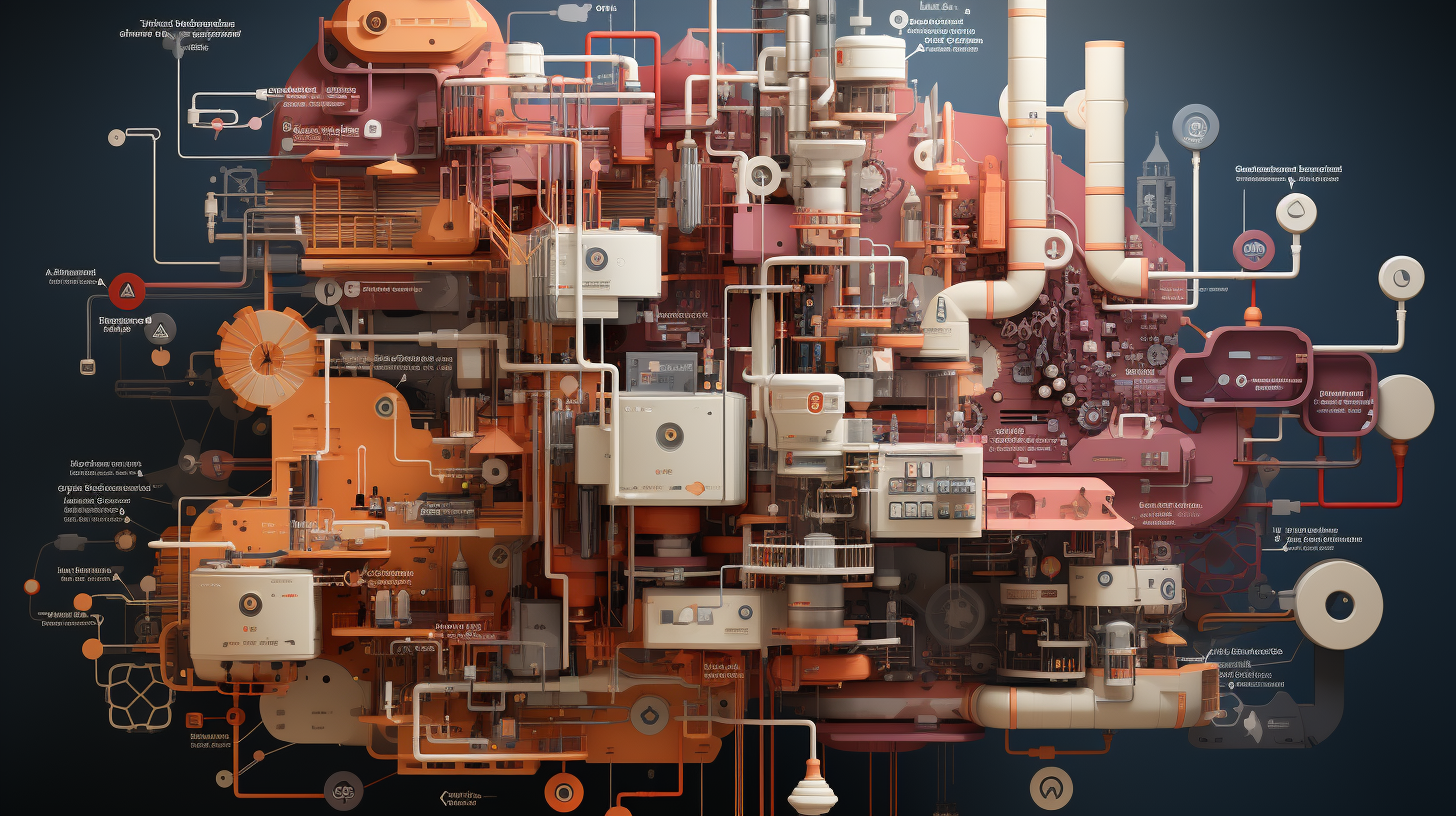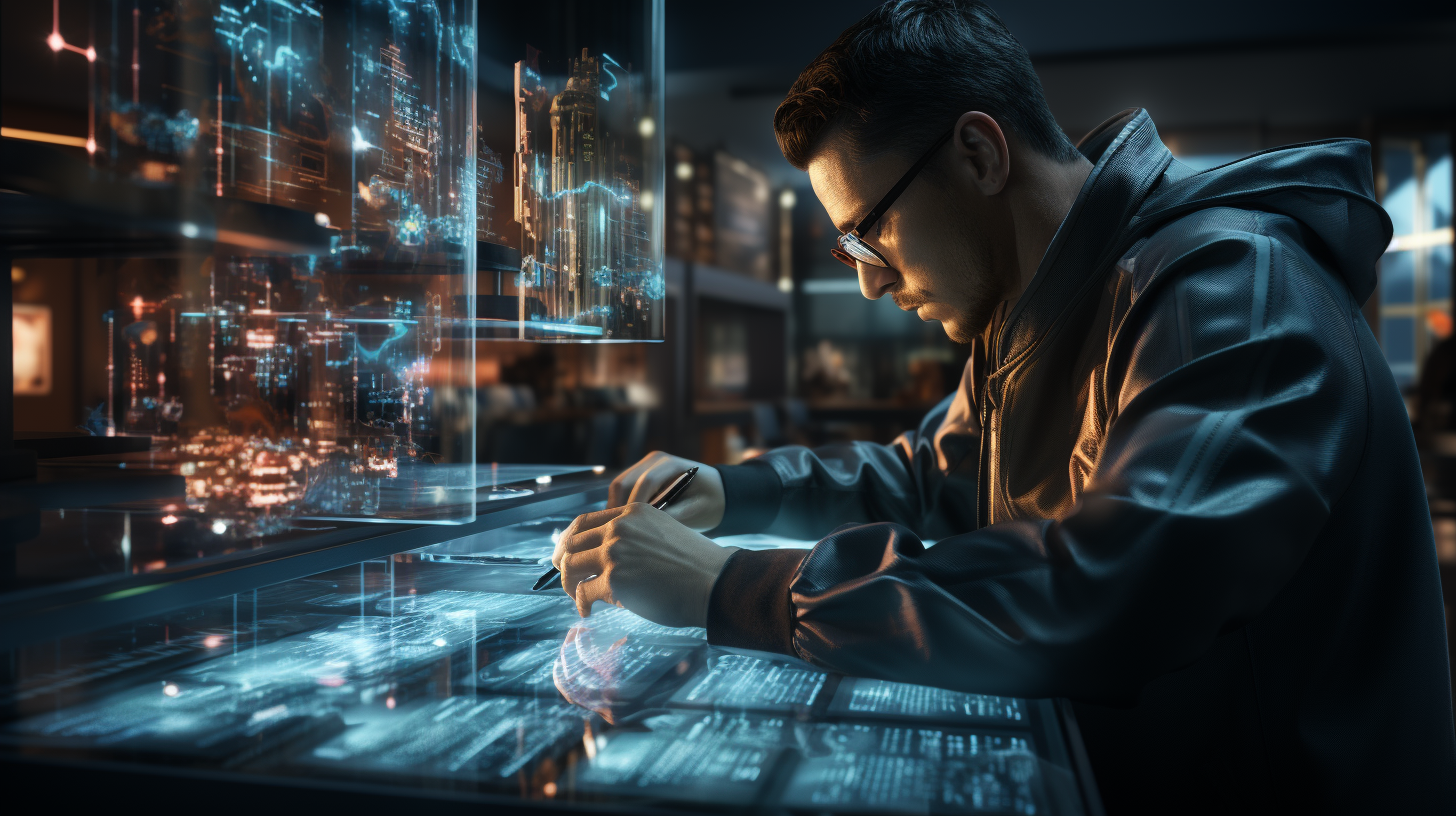Working Hand in Hand with AI
Just like Pandora’s box that held all the secrets of the world, Artificial Intelligence (AI) holds a myriad of possibilities, especially in the realm of content creation.
You’ve probably heard about AI, but have you ever wondered how it’s shaping the content creation landscape? It’s not just about robots writing articles, it’s a lot more nuanced than that.
Whether you’re a content creator, marketer, or just a tech enthusiast, understanding the role and impact of AI in content creation can provide profound insights. This article will guide you through the intricate process of AI content creation, its benefits, drawbacks and the potential future.
It aims to demystify complex concepts and provide an unbiased view of the advancements and impacts of AI. So, prepare to delve into the world of AI and content creation, where creativity meets technology in a dance of possibilities.

Key Takeaways
- AI in content creation has numerous possibilities and is more than just robots writing articles.
- AI can analyze data, predict trends, and write content, allowing for personalized newsletters, tailored advertisements, and customized website experiences.
- AI in content creation revolutionizes digital storytelling and enables the production of vast amounts of content simultaneously.
- While AI in content creation offers efficiency and automation, there are potential ethical concerns about plagiarism and originality, and it may not match human creativity in depth and nuance.
Understanding AI and Its Role in Content Creation
Imagine AI’s role in content creation as a masterful painter, effortlessly blending words and ideas, just as an artist would with colors on a palette, to create engaging and compelling narratives that resonate with the audience.
However, it’s not all rosy. There are issues of AI Ethics and Creativity Limitations to consider. AI, though highly advanced, is still a machine. It can mimic human creativity, but it doesn’t possess the emotional depth or the nuanced understanding of culture and context that humans do. That’s where the ethical conundrum lies – in the balance between AI’s capabilities and its limitations.
And yet, the potential of AI in content creation is undeniably vast. As we delve deeper, we’ll explore how this process unfolds, shaping the future of content creation.
The Process of AI in Content Creation

In the realm of digital storytelling, it’s the process of AI that’s transforming the way we craft and deliver narratives. AI-powered tools analyze data, predict trends, and even write content, freeing you from repetitive tasks.
| AI Process in Content Creation | AI Ethics Considerations | Content Personalization |
|---|---|---|
| Data Analysis | Respect for Privacy | Personalized Newsletters |
| Trends Prediction | Bias Prevention | Tailored Advertisements |
| Content Generation | Transparency | Customized Website Experience |
.
AI Ethics are crucial in this process, ensuring respect for privacy, preventing bias, and promoting transparency. Coupled with content personalization, AI can deliver newsletters, advertisements, and website experiences tailored to individual preferences. As we continue to harness AI’s transformative power, we’re setting the stage for a more efficient, personalized, and ethically-conscious content creation landscape. Now, let’s explore the manifold benefits of this AI-driven revolution in content creation.
Benefits of Using AI in Content Creation

Harnessing the power of AI in digital storytelling isn’t just smart; it’s revolutionary, akin to swapping out a paintbrush for a high-speed 3D printer. For instance, let’s take a look at a renowned media company that’s embraced this change: The Washington Post. They’ve introduced an AI-powered technology called ‘Heliograf’, which churned out around 850 articles in its first year alone. This is a striking example of how AI can boost efficiency, enabling teams to focus more on complex stories while the mundane reporting is taken care of.
- AI Personalization: AI can tailor content to specific audiences, boosting engagement.
- Content Efficiency: AI can create content quicker and with fewer errors.
- Time Saving: AI can automate repetitive tasks, freeing up creative time.
- Scalability: AI can produce vast amounts of content simultaneously.
- Consistency: AI ensures uniformity in content production, maintaining brand voice.
As we delve deeper into the benefits, it’s important to remain cognizant of the potential drawbacks and criticisms that come with AI in content creation.
Potential Drawbacks and Criticisms of AI in Content Creation
While you revel in the advantages of utilizing cutting-edge technology for digital storytelling, it’s crucial to not overlook the potential pitfalls and criticisms that come bundled with this innovation.
Key among these are ethical considerations. As AI becomes more prevalent in content creation, questions about plagiarism and originality may arise. Can an AI truly create unique and innovative content, or is it merely regurgitating information it’s been fed?
Another criticism involves human creativity. AI may be able to churn out content rapidly, but can it match the depth and nuance of human thought and emotion?
These drawbacks need to be carefully weighed against the benefits. As we move forward, the evolving role of artificial intelligence in content creation promises to be a fascinating journey.
Future of AI in Content Creation

You’re about to dive into the future of AI in content creation, where emerging trends and developments are shaping the industry in unprecedented ways. Brace yourself for a deep dive into how AI’s impact on the job market and various industries might redefine work as we know it.
This journey will unravel complex concepts in a simple, understandable language, providing an unbiased look at the advancements and implications of AI technology in content creation.
Emerging Trends and Developments
Did you know that an astounding 20% of business content could be authored by intelligent machines by 2024? This isn’t just a wild prediction; it’s based on emerging trends in AI and content creation.
For instance, AI’s ability to analyze huge data sets is facilitating content personalization on a scale that was previously unimaginable. Moreover, AI ethics is becoming a significant focus, as developers strive to ensure these machines create content that is fair, unbiased, and respectful of privacy.
These advancements, however, don’t come without their challenges. As AI increasingly moves into content creation, concerns about its impact on the job market and industries are growing.
Let’s delve deeper into this issue in the next section.
Impact on Job Market and Industries
Imagine, for a moment, how the landscape of your workplace might change as machine learning and automated systems become more prevalent. The rise of artificial intelligence in content creation has significant implications for the job market and various industries.
Consider these potential impacts:
- AI-driven unemployment due to machines replacing manual labor.
- Skill redundancy as automated systems take over repetitive tasks.
- Transformation of job roles, with a focus on skills that machines can’t replicate.
- The necessity for continuous learning to keep up with rapidly evolving technology.
- Creation of new job opportunities in the field of AI and machine learning.
It’s essential to stay informed and adaptable, embracing the freedom to learn and grow with the technological advancements. This new era of AI isn’t just about job displacement, but also about job evolution.
Frequently Asked Questions
What is the general cost of implementing AI in content creation?
The cost of implementing AI in content creation varies widely. It depends on AI efficiency and content customization needs. Though upfront costs can be high, long-term savings from automation and personalization are significant.
Are there any specific industries that benefit more from AI content creation?
Just like a key unlocking hidden treasures, AI efficiency reveals sector-specific advantages. Industries like marketing, media, entertainment, and education reap more benefits, translating complex content into simple, engaging narratives, freeing you from mundane tasks.
How does AI handle different languages and cultural nuances in content creation?
AI localization challenges include managing languages and cultural nuances. AI’s multilingual content generation abilities can help, by learning from vast data sets and adapting content to resonate with different audiences globally.
Can AI replace human content creators completely?
Can robots pen Shakespeare’s sonnets? Not quite. AI limitations, such as lack of creative authenticity, prevent total replacement of human content creators. While AI can assist, it can’t fully replicate our creative spark.
What are some of the ethical considerations when using AI in content creation?
Consider the potential for AI bias in shaping narratives and the impact on data privacy. It’s vital to ensure AI doesn’t perpetuate stereotypes or misuse personal information in creating content. Always adhere to ethical guidelines.
Best, Don
Social Posts
X/Twitter
Explore the intricacies of #AIContentCreation – from analyzing data and predicting trends, to generating content at scale. AI offers efficiency, but should not fully replace human nuance. #ContentMarketinghttps://t.co/w3woHHmE8Q
— AutoBlogging.Org (@AutoBloggingOrg) October 30, 2023
